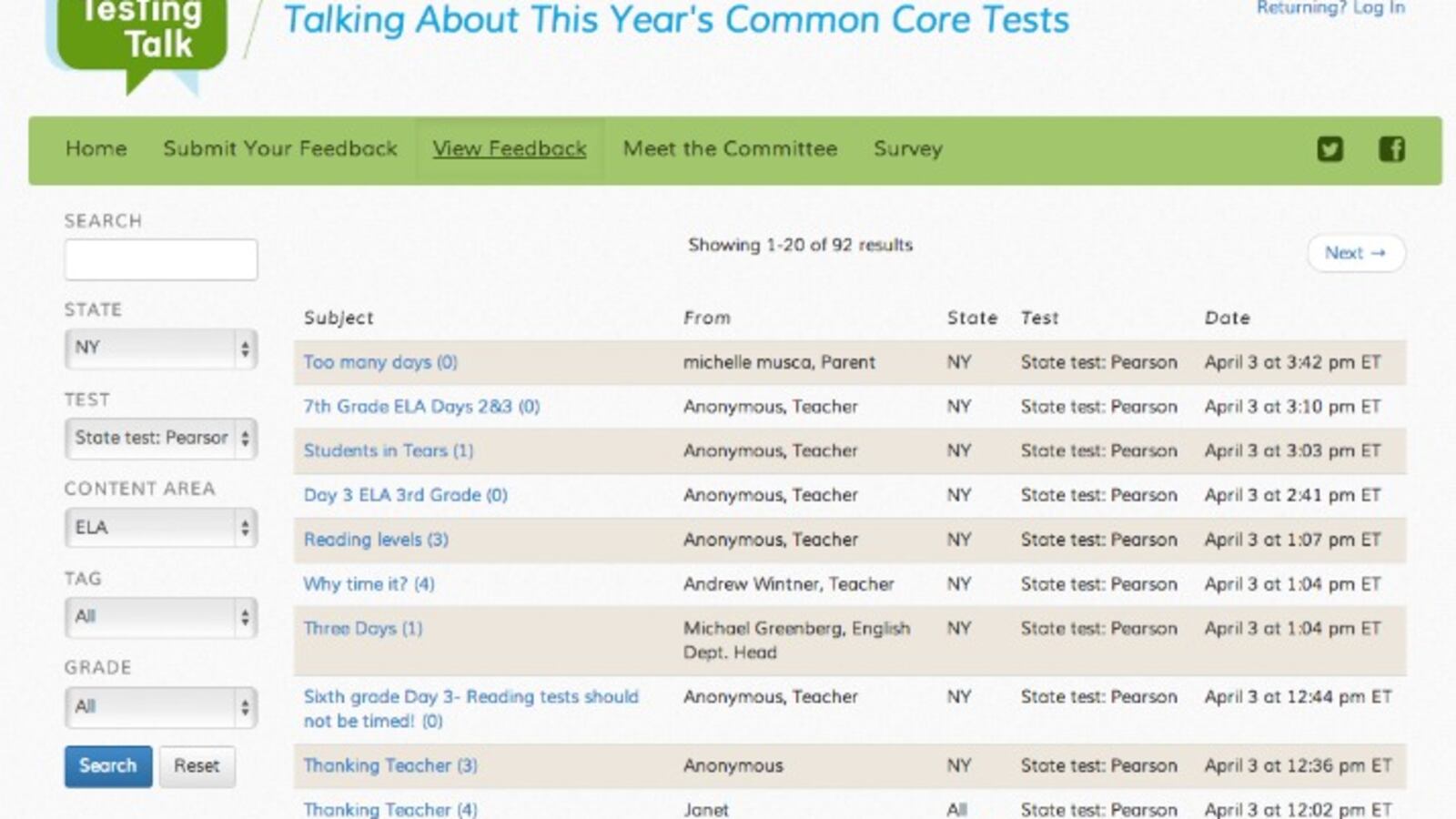The reviews are in, and students found this year’s state English exams “stressful,” “exhausting,” “confusing,” and “soul crushing,” according to mostly anonymous comments by educators on a new testing feedback site.
As New York students in grades three through eight sat for three days of Common Core English exams this week, some of their teachers have posted missives about their students’ experiences and the tests themselves on a new site created for that purpose, called Testing Talk.
The educators from across New York who took to the online forum represent a tiny fraction of the state’s educators. But their overwhelmingly critical comments were also remarkably consistent: The tests were too long, too difficult for many students, and a poor reflection of the thoughtful, critical work called for by the Common Core standards.
Students had between 50 and 70 minutes to complete each test, depending on their grade and the day of the exam. Many students were left racing against the clock to finish, teachers said.
“When I announced there was only ten minutes remaining, more than half my class had not even started the extended response!” one teacher commented, adding that only two or three students finished all the questions in time.
Older students faced 42 multiple-choice questions on day one, but “60 minutes in and I had children on question 21,” a fifth-grade teacher said. “As I announced the time, I watched children scramble, mark answers, guess, but most of all I watched these same children who had given me their best, become defeated!”
Several educators said the time crunch forced students to trade inquiry for velocity.
“We have spent the year teaching students to be careful, thoughtful, deep thinkers,” a fourth-grade teacher lamented. “Today the objective was speed.”
One reason for the students’ slow pace, some educators said, were reading passages that were long and hard to tackle.
The eighth-grade test featured a Shakespearean poem, one teacher said, that was “extremely difficult.” Third graders faced “obscure vocabulary and unapproachable plot line” in a reading passage drawn from a 1950s book, another teacher wrote. And sixth graders stared down a piece of “so-called literature about sewing machines,” a different teacher posted.
Another cause for the slow-down, teachers reported, was all the close reading — the line-by-line analysis of the structure and meaning of a text through multiple re-readings, which is a staple of Common Core-based instruction. Several educators insisted such close reading is impossible within the constraints of a timed test.
“Many of the multiple choice questions were quite involved, requiring students to flip back and forth a number of times and re-read multiple times,” an eighth-grade teacher wrote.
Another eighth-grade teacher said the quality and complexity of some of the reading passages did not warrant the scrutiny some questions demanded.
“It felt like the test makers were trying to force a V8 engine (the multiple choice question) into a Yugo (the nonfiction reading passage),” the teacher wrote.
But a commenter chimed in on a different post, noting that the test is meant to measure students’ ability to provide “text-based answers,” a key tenet of the standards.
“I think they asked questions on purpose that students had to go back for,” the commenter said. “[Students] aren’t supposed to be able to just ‘remember’ — that is the point.”
Many educators said the tests were especially arduous for English-language learners and students with special needs.
One special-education teacher said the extra-time accommodation amounted to “an endurance test” for students with disabilities. Others noted that special-education teachers tailor their lessons to each students’ particular needs all year long, and yet those same students are forced to take the same state tests as every other student in their grade, regardless of their different needs.
“It’s wrong that the individualized education philosophy stops at Common Core testing time!” a special-education instructor said. “Parents should be outraged!!! I know I am.”
Testing Talk grew out of an online forum created last year by staff at the Teachers College Reading and Writing Project to gather educators’ responses to the first year of Common Core tests. The new site allows educators from across the country to give feedback about their state tests, as well as field tests for in-development Common Core exams.
The site had garnered about 150,000 hits and 300 posts by Wednesday evening, according to Lucy Calkins, TCRWP’s founding director. Its purpose is to hold the people making the tests accountable to those who must live with them, she added.
“There have been billions of dollars and millions of hours of children’s and teachers’ lives that have been invested in these new tests,” Calkins said. “My goal is to help educators to be part of the process of making better tests.”
Pearson, the publishing company with a five-year, $32 million contract with New York to create the state tests, referred questions about the site to state education officials.
Ken Wagner, the state education department associate commissioner who oversees testing, said that teachers play a role in creating the test. He added that the department also monitors teachers’ feedback once the tests reach the field, noting that complaints about a time-crunch last year led the state to reduce the number of questions on the upper-grade English tests this year while giving students the same amount of time.
Wagner also cautioned against reading too much into the comments on the online forum.
“Anecdotes posted on a website,” Wagner said, “that’s a particular community. That’s not necessarily indicative of a statewide trend.”
But criticism about this year’s tests have not been confined to the Internet. Educators at Brooklyn’s P.S. 321 sent notices to parents Thursday afternoon urging them to join a protest the following morning against what they called the poor quality of this year’s English tests.
“In my 10 years of teaching,” fourth-grade teacher Alex Messer wrote to parents, “I have never felt more devalued and outraged about a statewide test.”

